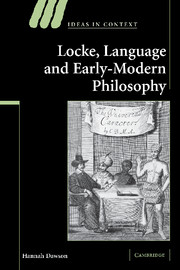1 - Language in logic
Published online by Cambridge University Press: 22 September 2009
Summary
Of the three arts of language, logic offers the most fundamental analysis of the subject. It deals most directly with meaning, that is, with the concepts and the things that words represent. It is for this reason that, while grammar comes first in the trivium, I begin with the second sister and her revelation of the heart of language.
Logic is an instrument for sound reasoning, and is often presented as yielding truth. At the end of the seventeenth century, the discipline is still firmly shaped by the Aristotelian Organon, but it is not a monolith. Its scholastic constitution, having been variously contested by humanist authors, is further developed by new philosophers from Bacon to Locke, whose Essay is an important contribution to the field. I have called upon the disparate voices in this parade to retrieve basic and commonplace assumptions about language and meaning.
WORDS AS SIGNS
Words are universally characterised as signs. The Manuductio ad logicam (1614) by Philippe du Trieu, a Jesuit scholastic logic that Locke both possessed and recommended to his students at Christ Church, defines speech (oratio) as significant sound (vox significativa). A word is said to signify its ‘signification’ or ‘meaning’. These two terms are used interchangeably in early-modern English. For example, in his Essay towards a Real Character, and a Philosophical Language (1668), John Wilkins translates ‘meaning’, or that ‘which is intended by any … sound or character’, as ‘sense, signification’. I generally use these terms in the same way.
Information
- Type
- Chapter
- Information
- Locke, Language and Early-Modern Philosophy , pp. 13 - 40Publisher: Cambridge University PressPrint publication year: 2007
